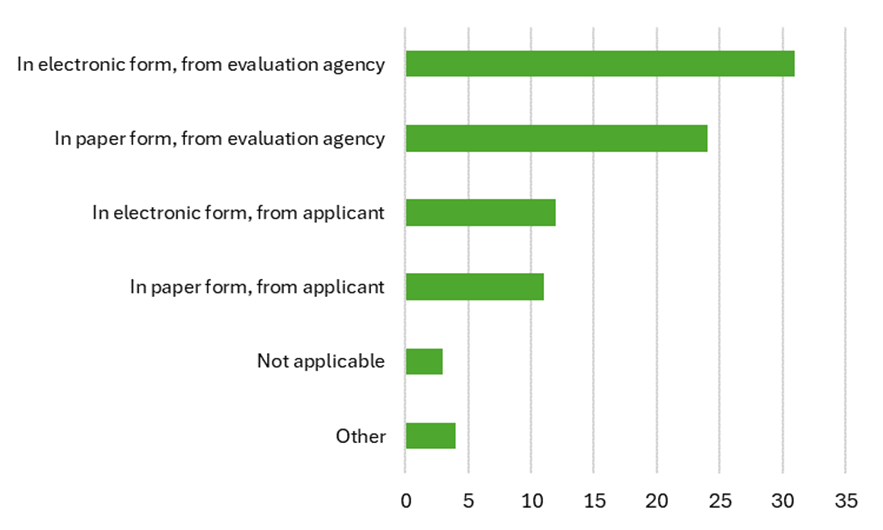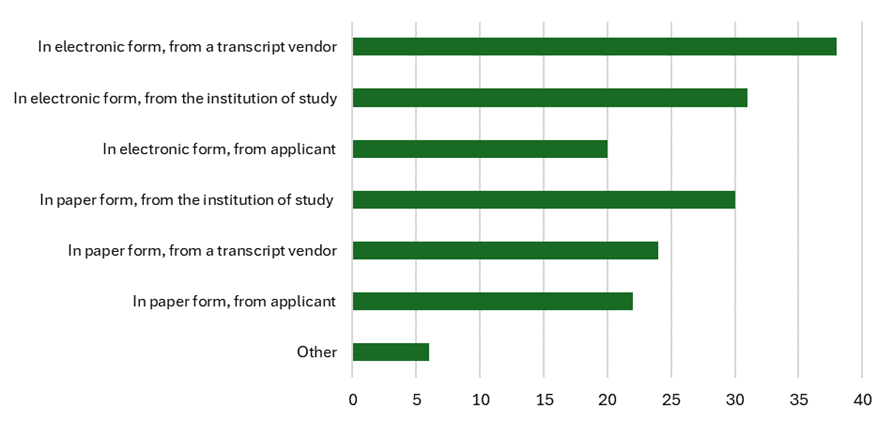Authors: Valerie L. Kisseloff, Senior Director of Admissions, Embry-Riddle Aeronautical University,
Aleks Morawski, Director of Evaluation Services,
Scholaro, Emily Tse, Senior Director of Knowledge Management, CGFNS International,
Margaret Wenger, Senior Director of
Information and Knowledge, Educational Credential Evaluators
The focus of the mission of the Digital Delivery of Credential Evaluations (DDCE) Working Group is to promote the digital delivery of foreign credential evaluation (FCE) report data to benefit stakeholders and maintain data integrity. The group was started
in 2022 by North American credential evaluators who collectively authored a position paper “Why North American HEIs are advised to accept credential evaluation reports digitally” and are working on further initiatives to promote moving
past paper evaluation reports and assessments efficiently and securely.
The delivery of student data, including the results of FCEs, was traditionally paper based. As technology advanced, domestic student data became digitized, and with the exponentially increasing numbers of students arriving from foreign countries in the
last decades, the same need arose in the international education industry. However, not all countries have comparable and compatible student data systems, if any. As such, credential evaluation services serve as not only the bearers of academic information
like credits, grades, and equivalencies, but also transfer the evaluated data to academic institutions.
Members of the DDCE group believe that paper reports are an outdated data transfer mechanism for reasons of inefficiency and lack of security. Delivery is hampered by the physical limitations of postal and courier services such as costs, delays, and general
time constraints. Paper reports are also vulnerable to alteration or outright fabrication, increasing the risk of using inauthentic data. Technology, specifically digital delivery mechanisms, solve these problems by offering instant transfer and have
the potential to greatly increase security.
Digital Delivery Mechanisms
In addition to the paper delivery of evaluation reports and assessments, there are currently several digital report delivery mechanisms being used today, with varying levels of security and efficiency.
A Snapshot of Current Practices
To develop a sense of how higher education institutions (HEIs) are receiving evaluation reports, the DDCE group and AACRAO teamed up to conduct a survey. A questionnaire was posted on various message boards and forums, including AACRAO, NAFSA –
Association of International Educators, The Connection from Educational Credential Evaluators (ECE), and The Association for International Credential Evaluation Professionals (TAICEP).
The poll received 47 responses (77% US, 17% Canada, 6% unspecified). This number represents a typical response rate for technical subject matter in this field. That said, one must note that this is not a scientific study, and the results reflect those
institutions whose staff are active in online forums.
The questionnaire focused on accepted delivery mechanisms for international transcripts vs. evaluation reports, as well as views towards the adoption of their digital delivery. The results revealed that respondents commonly receive international transcripts
electronically, whether from the institution of study or its established vendor. The next most common method is paper delivery from these two sources. Less widely used are transcripts submitted by the applicant, whether in electronic or paper form.
Figure 1: How International Transcripts are Received by HEIs at the Time of Enrollment, Respondents were asked to check all that apply.

A similar trend was found with the delivery of evaluation reports. The most common use is electronic reports, followed by paper ones, issued directly by the evaluation agencies. Less common are evaluation reports submitted by the applicant, both electronic
and paper form.
Among the electronic delivery methods identified, whether for international transcripts or FCEs, email attachment appeared most frequently. Email attachments, unfortunately, are not regarded as secure, particularly as one can run the risk of being
subjected to spoofing. It is hoped that with time, more secure methods will be recognized and adopted.
Figure 2: How Credential Evaluation Reports are Received by HEIs, Respondents were asked to check all that apply.

Higher Education Institution (HEI) Perspective
Making a case for secure digital delivery of FCEs is a no brainer. International students already face an uphill battle when it comes to the application and admission process.
International students are tasked with navigating an unfamiliar educational system. They have the burden of securing their foreign transcripts, and some no longer live in the same country as the institution they attended. Document turnaround times
can be lengthy and then there’s the added cost to translate and evaluate their credentials. That doesn’t factor in English language proficiency requirements or other documentation required for student visas.
Higher education institutions operate in an ever-changing landscape. To remain competitive, institutions need to adapt to the latest trends and technology. While paper transcripts still exist, more schools are turning to electronic delivery, which
offers up a faster and more secure alternative. We’re seeing digitization of many aspects of higher education, and 3rd party electronic delivery of transcripts is commonplace. Why treat FCEs differently?
The case for digital delivery is an easy one. It reduces processing time for international applicants. It minimizes opportunities for fraudulent or altered documents. The lift for schools is minimal and the benefits are significant. International
applicants should have the same access to move quickly through the admissions process as their domestic counterparts and digital delivery of FCEs is a must. The benefits far outweigh any risks and the overall experience for students and staff
is improved.
If your institution isn’t currently accepting secure digital delivery of FCEs, it’s time to make a case to your leadership. Do your research, read the white paper, and make the change. It’s one you won’t regret!